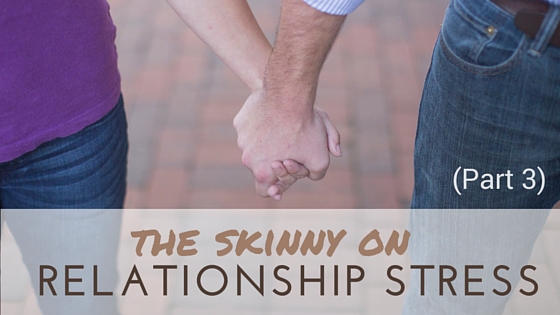Stress affects how you think, feel and behave, but it also affects your relationships with others, including relationships with romantic partners, family and friends. This week, in the third installment of our series on stress, we’ll explore how you can bolster your relationship’s capacity to serve as a source of support during challenging times. To begin, however, let’s take a look at how to pinpoint the sources of relationship stress.
Earlier this month, we discussed different types of stressors that can impact your life. When it comes to your life with someone else, stressors can originate from outside of your relationship and from within your relationship—and some stressors may be completely unavoidable. Examples of relationship stressors include:
- Problematic communication patterns, such as criticism
- Health-related difficulties
- Work-related difficulties
- Financial-related difficulties
- Poor coping skills, often leading to unresolved arguments
Despite the stressor’s cause, your ability to manage the impact of the stressor will largely depend on your awareness of the stressor itself. When you consider the stress that affects your relationships, ask yourself these questions:
- How new is the relationship? Essentially, is the stress in your relationship related to the maturity of your relationship? For example, newlyweds will experience very different stressors as compared to couples that have spent decades together.
- How often? How often does the relationship feel stressful? Once in a while or pretty regularly, on average?
- How stressful? When stress occurs, is the effect temporary or ongoing? How intense are the effects?
- Which relationships? Is this stress unique to this relationship or is this a frequent experience in other relationships, including those with family and friends?
After you have an idea of the stress at hand, consider how you’ll work collaboratively to address it. The idea here is that you hone your “we” problem-solving skills, often maximizing your individual talents for the benefit of the relationship as a whole. The following tips can help you begin to do just that:
- Practice acceptance. Look for an answer to the problem if possible, but embrace the fact that some problems don’t have easy, obvious solutions.
- Avoid getting stuck in the blame game. Instead, acknowledge that relationships can be powerhouses for solution-making.
- Turn the problem into an “It”. Rather than turning on each other, focus on the situation as the problem.
- Be comfortable with flexible roles. During times of stress, it’s common to become more rigid and set in your ways, but flexibility may ultimately be the key to your success. Consider doing things differently, from chores to time management.
- Show tolerance for each other’s reactions. Remember that everyone responds to stress differently, and instead, try to increase the effectiveness of your collaborative solutions.
- Find small ways to stay connected. Avoid isolation. For example, laugh with your partner when you can. We took a look at how helpful humor can be in the face of stress. Click here to learn more.
- Rally your resources. Because it’s not always easy, and you don’t have to do it alone.
At TherapyWorks, our experienced therapists can help you overcome relationship stress using research-based practices and a personalized touch, and our clients enjoy perks that aren’t often found with other counseling agencies, such as a professional and responsive support team, convenient scheduling options, evening and weekend appointments, and contemporary privacy practices.
We encourage you to take advantage of a free consultation in either our Los Gatos or Santa Cruz locations. Contact us today, and we’ll assist you promptly.
